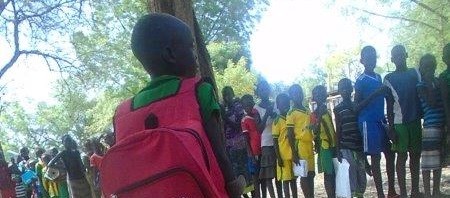The author of this article says that South Sudan needs to break its cycle of conflict in order for women and children to have opportunities to study and thrive.
By the time this article is published, women around the world will have already celebrated International Women’s Day on Tuesday, 8th March. The theme for this year’s celebrations will be ‘Planet 50-50 by 2030: Step It Up for Gender Equality’.
Coming on the back of the new Sustainable Development Goals (SDGs) set by world leaders last year, the theme is quite fitting, especially given that the leaders pledged to empower and promote socio-economic and political inclusion of all irrespective of age, sex, disability, race, ethnicity, origin, religion or other status.
While women in other parts of the world are pushing their governments to do more to promote gender parity, South Sudanese women are pushing their government and the international community to bring lasting peace to end their suffering. The demand for peace in South Sudan is unquestionable, especially in the current conflict context. Many generations of women have missed the opportunity to study because of the vicious cycle of conflict in South Sudan.
With every conflict, women are forced to flee to refugee camps or internally displaced peoples (IDP) camps to save their own lives, as well as their children’s lives. In these unfortunate situations, many young girls end up becoming bread winners instead of going to school. Cultural practices in South Sudan reinforce the unfair discrimination against girls when it comes to accessing educational opportunities, and this has made it difficult for women to progress and compete for gender parity.
For some women, the damage that conflict inflicts on their lives is beyond repair. Nyawan, a mother of four who I met in Akobo last week is the epitome of this tragedy. In 2014, she sustained severe injuries when a bomb exploded near her as she was coming back from the market with her eight year old son called Joseph*. She sustained injuries on her left hand and leg, and her son’s right leg was amputated.
First Sighting
Joseph is now 10yrs old, and I first set my eyes on him as he limped forward to receive a schoolbag and exercise books that were being distributed by Save the Children in Akobo Mission Primary School with financial support from European Humanitarian Aid and Civil Protection (ECHO). My immediate instinct was to approach this young man and find out what happened to him. With his books and schoolbag in hand, Joseph and I sat under a tree in the school compound and he narrated his story.
“We were coming from the market with my mother. As we were approaching the place where we normally play with my friends, a bomb exploded and I was injured on my leg, and my Mum was injured on the hand and her leg.” said Joseph. My spirit shrunk when I heard those words from this little boy. In fact, for a few minutes, I was completely lost for words. I asked Joseph if it is okay to visit him at home so that I find more about his story from his mother, and he accepted.
Triple Tragedy
At the time of her injury, Nyawan was pregnant with her youngest daughter. It seems the impact of the blast and her injuries affected the baby in the womb, and her daughter was born paralyzed. She is two years old now, but she can neither sit, nor talk. With her injuries, Nyawan herself cannot work effectively to provide for her children, and her husband died sometime back.
“When the incident happened, I felt bad because my only son was also injured, and his father had died. I thought he would be the one to help me in the future, but there is little chance of that happening now.” Nyawan said, adding that, “…I wanted to go to a refugee camp because I have no energy to work. My hand is paralyzed, I cannot even raise money to buy exercise books and pens for Joseph. For now, I can’t move out of the house because I have to be with my child all the time” Nyawan said.
Sign of hope
Joseph’s injury healed after almost a year and he was able to return to classroom, thanks to ECHO funded Children of Peace education programme implemented by Save the Children in Akobo. The programme has provided children affected by conflict like Joseph an opportunity to learn even under most trying circumstances. The return of Joseph to school has renewed both Joseph and Nyawan’s hopes.
“Thank you Save the Children for the bag, books and the pens. When I was injured I thought I was not going to join school again but after I recovered I decided to come to school,” said Joseph.
“After completing my education I want to become a pilot so that I can see all parts of South Sudan and the world” Joseph said with smile.
“I am happy that Joseph is getting support from Save the Children without this support he wouldn’t be able to go to school. I hope this support will continue otherwise it will be difficult for him to complete his education. When Joseph completes his education he will be able to support me and his sisters. Whatever profession he chooses in the future, I will be happy,” Nyawan concluded.
Nyawan’s story is just one of the hundreds or even thousands of the untold stories of how disastrous conflict can be to human life and prosperity.
*The name of Nyawan’s son has been changed to protect his identity
Emmanuel Kenyi is the Deputy Information and Communications Manager for Save the Children – South Sudan
The views expressed in ‘opinion’ articles published by Radio Tamazuj are solely those of the writer. The veracity of any claims made are the responsibility of the author, not Radio Tamazuj.




